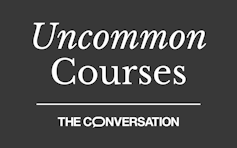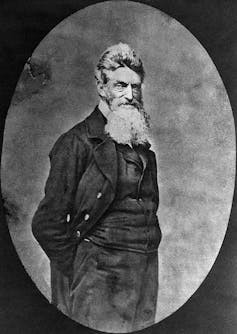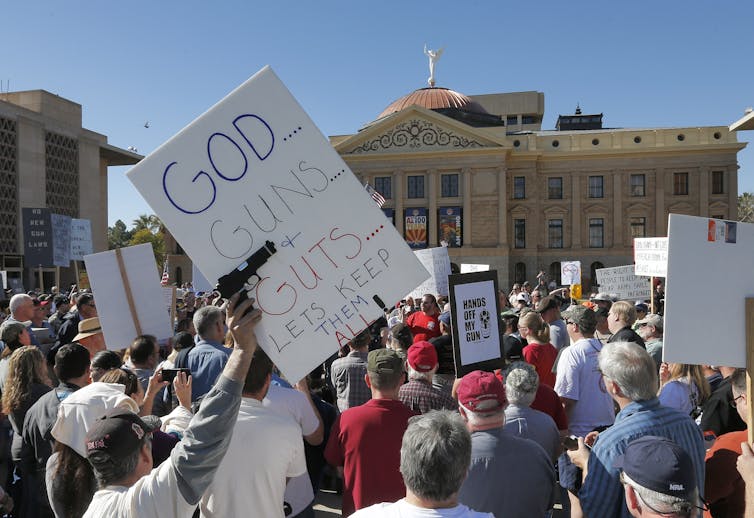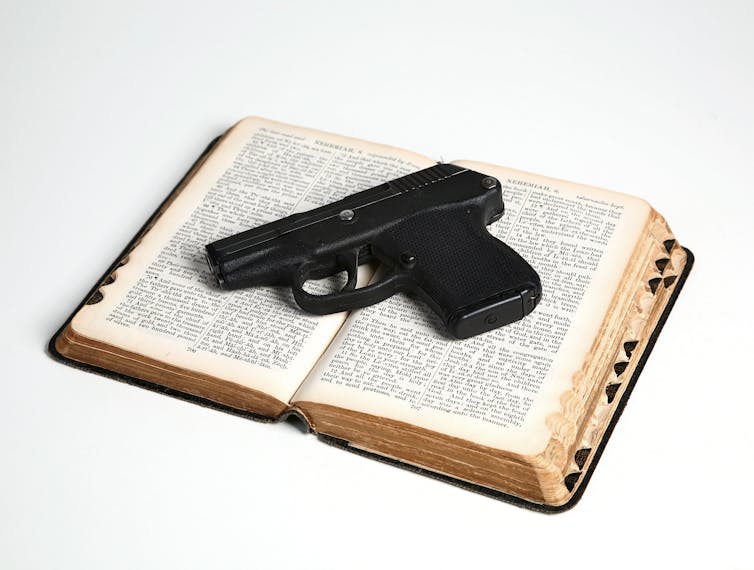My Course Examines Why God and Guns Go Together in America
Views on guns are intertwined with views on God for many Americans. RichLegg/E+ via Getty Images
Joseph P. Slaughter, Wesleyan University

Uncommon Courses is an occasional series from The Conversation U.S. highlighting unconventional approaches to teaching.
Title of course:
“God and Guns: the History of Faith and Firearms in America”
What prompted the idea for the course?
As a religion professor, I’ve come to know many students from other countries who identify as Christian. I realized they were puzzled at some of the things Americans often bundled into their faith – things these international Christians didn’t consider relevant to their own religious identity.
One issue in particular sparked a question from a South Asian Christian student: Why did American evangelicals seem to have such an affinity for firearms? For example, Pew Research indicates 41% of white evangelicals own a firearm, compared with 30% of people in the U.S. overall. This unsettled the student, since they shared much of the same theology, and they wanted to know more about this connection.
I was embarrassed to admit that I didn’t have a satisfactory answer. Since I was trained as a historian of the 18th and early 19th centuries, I suspected it wasn’t explained by the last 10 or 20 years. I knew we needed to go back and start with the Colonial era and work our way forward. This course is my humble attempt to answer these students’ questions.
What does the course explore?
We spend the first two weeks reading what the Bible says about violence. There are no firearms in the ancient text, of course – but there are plenty of other weapons.
For example, hymns of celebration after defeating enemies, such as when Jael hammers a peg through the head of the military commander Sisera in the Book of Judges, appear to celebrate violence.
In the Sermon on the Mount, however, Jesus teaches his followers to turn the other cheek. What do American Christians think about these types of passages, and to what degree do they inform their approach to firearms?
The surprises in the text are endless, especially since very few of my students have ever read the Bible.
Our readings help contextualize key themes in American history as we move through the course: from the Colonial era, when firearms, religion and violence were intertwined aspects of settlers’ lives, to the Cold War, when we discover how evangelicals embraced a masculine, warriorlike idea of Jesus.

Portrait of John Brown (1800-1859). Corbis Historical via Getty Images
Together, we explore digital and archival sources that show a wide range of attitudes toward weapons. For example, the abolitionist John Brown’s prison letters provide a fascinating window into how faith and firearms can be central to someone’s cause. Brown was a Christian who believed so strongly in abolishing slavery that he was convinced God had appointed him as his agent of violent judgment. The letters were written just prior to Brown’s execution in 1859, after his failed attempt to spark a slave uprising in Harper’s Ferry, Virginia (now West Virginia).
Why is this course relevant now?
Americans live in a country where politicians’ platforms often focus on God and guns.
Some are overtly weaving it into their election pitch, such as U.S. Senate candidate Josh Mandel of Ohio, who called himself “pro-God, guns and Trump,” while other Republicans such as Colorado Rep. Lauren Boebert and Kentucky Rep. Thomas Massie included guns in Christmas messages.

A crowd outside the Arizona State Capitol in Phoenix in 2013, during a Guns Across America rally. AP Photo/Matt York
What’s a critical lesson from the course?
American Christians, including evangelicals, are a diverse lot. The “peace church” tradition – the Mennonites, Amish and Quakers, among others – may not often grab headlines, but complicate the narrative about guns and God in U.S. culture.
Many other types of Christianity do not embrace firearms, either. For example, Pew Research found that only 52% of Black Protestants have fired a gun, compared with a 72% average among all Americans.
Yet from the time of the Puritans onward, many Christians have viewed America as a divinely inspired nation – an idea that often served to sanction violence, whether in a war for Indigenous lands, defending slavery or leading a revolt.
What will the course prepare students to do?
Hopefully this course will equip students to coherently answer the question of why American religious culture is so intertwined with gun culture – especially if the subject comes up at Thanksgiving dinner.
More seriously, the better that people in America understand how their predecessors viewed firearms, the more robust and productive debates will be over their place in American society today.
Joseph P. Slaughter, Assistant Professor of the Practice in Religion and History and Associate Director of the Center for the Study of Guns and Society, Wesleyan University
This article is republished from The Conversation under a Creative Commons license. Read the original article.
